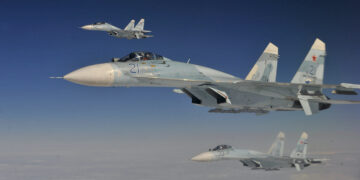November 26, 2018
Statement: Washington should maintain a balanced approach to U.S.-Russia policy
FOR IMMEDIATE RELEASE:
November 26, 2018
Contact: press@defensepriorities.org
WASHINGTON, DC—Defense Priorities Senior Fellow and Defense Scholar Benjamin H. Friedman has issued the following statement on the Ukraine-Russia standoff in the Kerch Strait:
“By attacking and seizing three Ukrainian ships in the Black Sea, Russia has increased tensions with Ukraine. The United States should join its European allies in calling for the return of ships and the reopening of the Kerch Strait, allowing ships to enter the Sea of Azov, which Russia blocked in the wake of the incident. But we should also guard against being propelled into a new Cold War, an approach that promises little but heightened risk and cost.
“As an advocate for open seas and abiding by agreements, the United States should take Ukraine’s side diplomatically. Under a 2003 treaty with Russia, Ukrainian ships have the right to freely transit the strait. Russia’s action is doubly wrong in that it serves Russia’s policy of attacking Ukrainian sovereignty by backing rebels. U.S. policy on the conflict should be to advocate a settlement that restores Ukraine’s pre-war borders.
“Yesterday’s incident is an example of the challenge in maintaining a balanced policy toward Russia. When Russia acts badly—by murdering people abroad, suppressing dissent, meddling abroad, or military aggression—U.S. leaders should vocally disapprove and use policy to demonstrate that such actions have a cost. At the same time, U.S. leaders should keep the following in mind:
“The United States is not responsible for protecting Ukraine. No treaty or important U.S. interest obligates the United States to fight for Ukraine.
“Punitive actions toward Russia might please Kiev while damaging U.S. security. Hiking military aid to Ukraine, for example, might just delay its ability to reach the modus vivendi with its more powerful neighbor. That might appeal to Ukrainians who see their own relative weakness as a rationale for entering NATO and getting the protection of the U.S. military. But that course would add defense costs for the United States and greatly increase the odds of a major or nuclear war, without any clear security benefit to America.
“Cooperative relations with Russia advance several U.S interests: arms control deals, exiting Syria, and, in the longer term, even balancing Chinese power. Actions meant to punish Russia could provide leverage in these other areas or provoke a backlash disruptive to progress.
“U.S. conflict with Russia can be reduced by recognizing that our European allies should take the lead in balancing its power and sanctioning its misconduct.
“Cooperative relations with Russia do not require praise or ideological harmony. The United States should join its allies condemning Russia for its misdeeds while acknowledging its status as a major power with a vast nuclear weapons arsenal. Russia is not a burgeoning hegemon poised to restore the Soviet empire. Nor is it a weakling likely to collapse and reform as a nice liberal place any time soon. The United States should treat Russia with firmness, respect, and recognition that it poses little direct threat to us.”
More on Ukraine-Russia
Featuring Daniel Davis
September 8, 2025
Events on Ukraine-Russia








